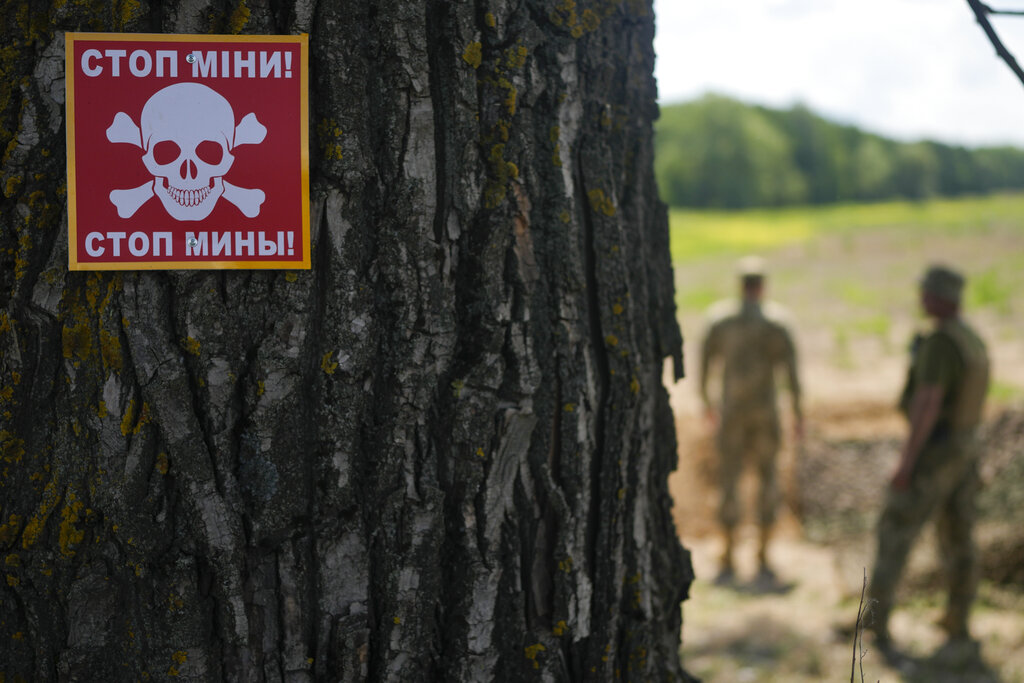
Russian land mines in Ukraine threaten food security across the globe
Mitzi Perdue
Video Embed
Imagine you’re in a car, driving along an unpaved country road in Ukraine. It’s February, but poking out from the snow on either side of the road, you can see hundreds of acres of blackened, unharvested sunflowers. A quarter of a mile ahead of you, a dark green military truck appears on the horizon. Wanting to keep your distance, you stop and watch as the vehicle maneuvers perpendicular to the road, pointing the back of the truck toward the sunflower field.
As a Ukrainian citizen, you would know exactly what is happening: The Russian forces are planting thousands of land mines that will destroy these swaths of farmland by proxy and guarantee that the countries enduring food insecurity today will face famine tomorrow.
ONE IN 10 UKRAINIAN HOSPITALS ‘DIRECTLY DAMAGED’ BY RUSSIAN AGGRESSION
Some of the world’s most populous countries, including Bangladesh, Egypt, Indonesia, and Pakistan, depend on Ukrainian grain. The United Nations’s Food and Agriculture Organization recently reported that “25 percent of the Ukrainian rural population involved in agriculture stopped their activities or reduced their output due to the war. The situation is much worse in the most agriculture-dependent regions of Ukraine, where over 40 percent of rural families are affected.”
These land mines won’t go away by themselves when the conflict ends. Although the U.S. State Department is investing $91.5 million of dollars this year in helping the Ukrainians remove the Russian land mines, Congress is continuing to debate spending, and lawmakers are looking to slash the budget any way they can. We need to let our legislators know that we support the State Department’s investment in mine-clearing efforts in Ukraine.

Unexploded ordnance can remain dangerous for long periods of time. According to Michael Tirre, a program manager from the State Department’s Office of Weapons Removal and Abatement, “people in Belgium and France still die from unexploded mines or bombs that have been there since World War I. They’ve persisted in the ground for more than 100 years.”
To keep the same from happening in Ukraine, it’s important to invest in de-mining early on. This is a smart taxpayer investment. According to Tirre, “Removing land mines prevents injuries and fatalities, improves food security, preserves critical infrastructure, and makes hospitals and schools safe.” For Ukraine to recover, we need to be removing as many mines as we can right now.
The vehicles that the Russians use to plant these mines in Ukraine are loaded with dozens of rocket tubes on the back, arranged as in the typical Multiple Launch Rocket System. The Russians have taken these typical MLRS trucks and transformed them into lethal Zemledeliye mine-laying vehicles, designed to maximize damage to the land. The Russians use them to render agricultural land useless for long periods of time — decades or more.
Depending on which kinds of land mines are inside the rockets, there could be as many as 72 smaller land mines nested inside each rocket. One Zemledeliye vehicle can spray 3,600 land mines at a time onto prime agricultural land.
The harm that will result from these land mines will have a ripple effect throughout not only Ukraine, but our global trade systems and economy — which is why it’s essential that Americans don’t simply turn a blind eye or deprioritize resources simply because it’s not happening in our backyard. The damage will first be felt by the farmer whose land is contaminated with those land mines. In late April, when he’d normally try to plant his usual crops, he risks having his tractor blown up, and he could be maimed or killed.
Because of the land mine contamination, planting on his land is now a risk to his life — meaning he probably won’t even try. Without his livelihood, he faces the possibility of bankruptcy and destitution. However, his individual tragedy is only one small part of a larger disaster. The Russian invaders are using these Zemledeliye vehicles to scatter mines on an industrial scale. This means countless farmers face the same life-threatening decision, and as a result, we will continue to see global food shortages and supply chain problems.
The investment the State Department is making to help Ukraine de-mine its essential farmland is necessary, and continuing to budget our resources toward the war effort in Ukraine is an indisputable good. Helping de-mine Ukraine means a better life for the country of Ukraine and the general population, and it will prevent famine in some of the world’s most vulnerable populations.
CLICK HERE TO READ MORE FROM THE WASHINGTON EXAMINER
Mitzi Perdue is a writer, speaker, and author of the award-winning biography of Mark Victor Hansen, the Chicken Soup for the Soul co-author. All royalties for this book will go to supporting humanitarian relief in Ukraine.
